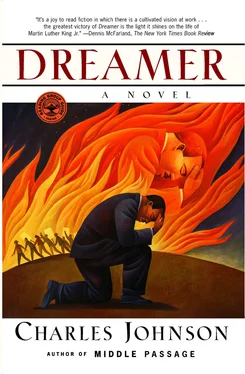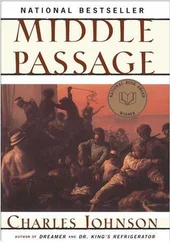From the gravel parking lot, we heard a spirited singing of “Peace Like a River.” Smith eased out of the car, holding his left side and listening, his head tilted to the right, humming along, yet he seemed hesitant to move any closer. Next came “Rock of Ages,’ and as this song shook the walls of Bethel, I took Smith’s arm and opened the door, and we slipped inside, treading softly on our soles like thieves, then sat in the last row of seats, hoping not to be seen. There were no more than fifty people in the room. Older women in simple, bright summer dresses held their hymnbooks, fanning with folded copies of the church’s newsletter, “The Trumpet.” Smith kept on chewing, his eyes tracking left, right, both hands squeezing his knees. He did not look comfortable. But there was something — I couldn’t say what — that had drawn him here.
Up front, Rev. Littlewood swabbed his forehead with a wadded handkerchief. He was a thirtyish, dark-skinned man. Jet black in complexion. He wore brown wing tips and unfashionable, heavy-framed black glasses, the sturdy, hard plastic sort you find sold at Army bases. The body he wore, and traveled about in, was thin, with small, bony wrists, and a voice that sounded seminary-trained, soft and scholarly, so gentle I had to bend forward on my seat when the singing ended and Littlewood walked to the small podium, took a sip of water from a pitcher on the table at his right, then asked his congregation to open the Bibles on the back of each bench and turn to Genesis 4:1—16.
“In this passage,” he said, “we find a terrible story about the sons of Adam and Eve. The younger brother’s murder, which brought death and guilt into our world, is often said to be a prefiguring in the Old Testament of the greater, far grander sacrifice of an innocent who died for our sins at Calvary. For many people — perhaps some of you here today — there is something disturbing in this tale. How can God be just if He rejected one brother’s gifts and exalted the other? The story makes our heavenly Father seem as capricious as any creature conjured from dust and condemned to return to dust.” Littlewood paused, having lost his place momentarily when he peered up to make eye contact. After finding where he left off, he kept a pencil in his right hand to mark his place when he looked again at the congregation. “I can’t believe our Lord is unfair. Remember, it is because He loves the brother who kills that He marks him so no man will do him harm, and it appears none did, for nowhere in the Bible are we told that he dies. And does not God say to the elder brother after rejecting his gift that if thou does well, shalt thou not be accepted? Long ago, in ancient times, the elder brother’s name was interpreted to mean ‘possession,’ and I believe his sacrifice was intended not to honor the Creator but to glorify himself, to win the Lord’s favor like a trophy, or an ornament he might wear. You see, he was given, if not a key to the kingdom, then at least one provocative clue. Oh, a cryptic one, to be sure, but we cannot say that in his moment of dejection he lacked good counsel. His deliverance — and surely ours — is wrapped in the perennial mystery of what that divine counsel, doing well, possibly means. Is there a single answer? I think not. As a question, it is open-ended, admitting of only provisional answers, a riddle that yields an inexhaustible reply, which is cast best not as a clever sentence but rather in the quality of sacrifice and sentience itself.”
Smith squinted all through Littlewood’s sermon, the look on his face skeptical, and he coughed when he heard something questionable. He took out his gum and stuck the wad on the bottom of his seat. I could not tell what he was thinking, though I would have wagered he’d forgotten more about Scripture and the world’s spiritual traditions than the young Rev. Liytlewood ever knew. After the sermon, Bethel’s pastor asked for contributions to help with the church’s remodeling. A silver plate was passed around. Then the congregation sang once more—“Grant Us Light”—and the days service ended, and a tired Rev. Littlewood positioned himself outside the entrance to shake hands with his tiny flock as they left, ask about their health and their children, and tease the little ones, each of whom he gave a candy cane wrapped in plastic.
When Smith and I reached the door, he said, “I noticed you two gentlemen when you arrived. Thank you for coming. I certainly hope you’ll come again. Were you thinking of joining, Mr. … uh …”
“Chaym Smith. No, I didn’t come to join anything.”
“Do you live around here?”
“For the time being. It’s temporary, like everything.”
“Are you a Christian, Mr. Smith?”
Smith chuckled. “You want the truth?”
“Yes, always.”
“Well, the truth is, I don’t know what I am, and I like it that way. Leaves me lots of room to be surprised every day.”
“That’s too bad. As you can see, it wouldn’t hurt if we had a few more people here.”
“Looks like you could use a decent gardener too. Whoever you had before didn’t know jack about landscaping or planting the right flowers for this climate. You want some goldenseal and blackberry lilies out front.”
Littlewood sighed. “Yes, you’re right. I’d do it, except I work at the bank in town. I have to. My salary is … nominal. We need someone to finish the work my predecessor, Reverend McCluskey, started on what was to be the library and a schoolroom for the children. And I wish to God we had someone good to keep up the grounds.”
“We could do that.”
I blurted out, “ We? ”
“The exercise will do you good, Bishop. The last carpenter they had here didn’t know the first thing about framing.”
“Could you?” Littlewood’s eyebrows raised. “I can’t tell you what a great help that would be to us. My problem is, we can’t afford to pay much,”
“I’m probably not worth much. Whatever you give me is fine.”
“We all have worth,” insisted Littlewood. “If you look in Psalms—”
“Pardon me, Reverend, like I said, I can keep this place up. Thing is, you’re better off, though, if you save the sermons — and all them explanations — for Sunday morning. Is that a deal?”
Littlewood laughed. “I’m hardly in a position to refuse anyone’s help.” He thrust out his right hand. “You have a deal, Mr. Smith.”
Were it not for my debt to Smith, and my concern for his recovery, I would have protested his shanghaiing me into involuntary servitude at Bethel AME. Every few weeks I would receive a postcard from Amy detailing the new job she found at Operation Breadbasket, and ending Miss you . She was all I thought about during the afternoons Smith and I cleared Bethel’s small cemetery, and when we pitched in on the weekends to finish the remodeling left undone and restore areas of the church in ill repair. (Yes, he volunteered me for that too.)
Bethel’s cemetery was centuries old. A boneyard overgrown with pickerelweed and wildflowers that obscured shovel-shaped headstones and weathered markers that leaned at angles. Names and dates for the dead, I noticed, were all but obliterated. Here and there I could make out epitaphs for Amy’s family. We spent the better part of a week ripping out overgrown bushes, moist, matted neckweeds, thistles and brambles, trimming back trees and hauling away barrels of trash. By dusk each day Smith and I worked until we were too tired to stand, with me perspiring so hard you could tell where I’d been standing because there I left a puddle, like some of me had melted away.
I decided this was too much — all this work — regardless of what I owed him for saving my life. In other words, he was doing this to work out his own demons, and all that bedeviled me was the distance between me and Amy.
Читать дальше












